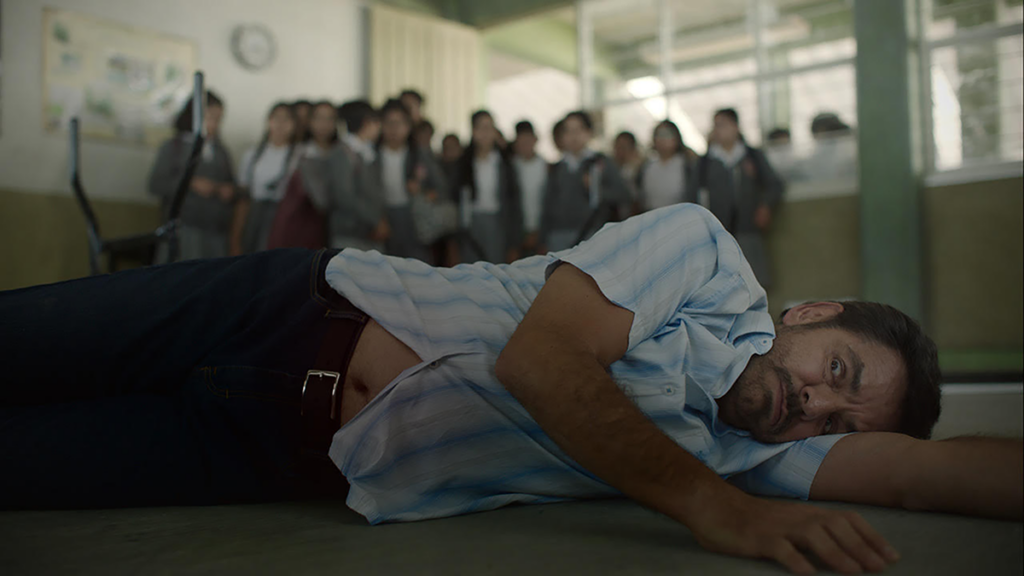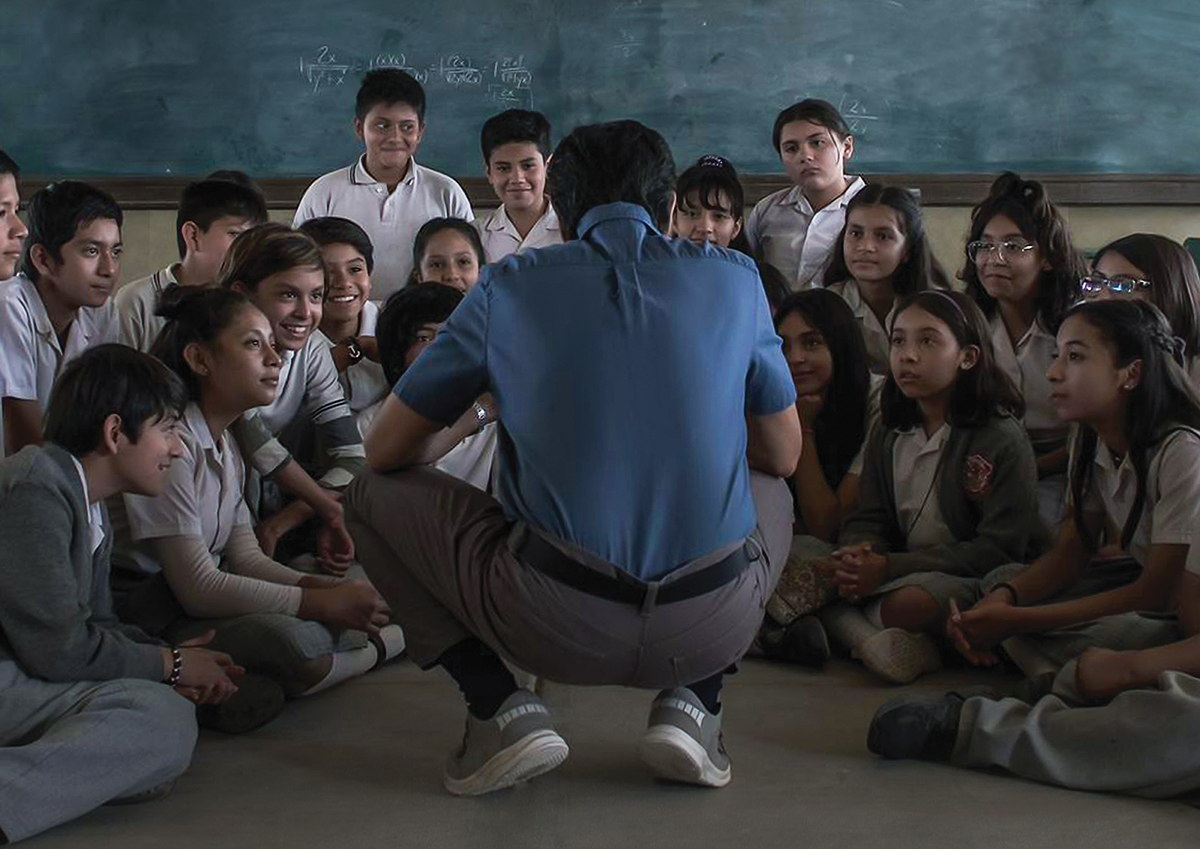“Do you know what’s the most important thing a teacher can tell their students?” Sergio Juárez asks in Radical, before walking away from his colleague and leaving his question hanging in the air. The moment reminding us he’s up against a public school system where apathy, corruption, and maintaining the status quo are the cornerstones of the curriculum.
This is just one of the scenes in Radical, among many, where the audience finds itself shaking our heads incredulously as we consider a seemingly hopeless situation at José Urbina López elementary school, in the violence-plagued Mexican border town of Matamoros. After all, la escuela has the lowest standardized testing grades in the entire country and almost no one expects children growing up surrounded by gangs, drugs, and poverty to become the next astronaut or philosopher or inspirational teacher.
But Radical, based on a true story, sets out to switch up the narratives around stereotypes of underprivileged brown kids from the frontera. Juaréz (played by Eugenio Derbez) is determined to shake things up when he arrives as a last-minute replacement at José Urbina López. Via his unconventional pedagogical methods (like, turning the chairs upside down to simulate ‘boats’ in an effort to introduce both the relationship between weight, mass, and density, as well as the existential question of ‘who deserves to live’), his mission is to encourage his 6th grade students to recognize, utilize, and reach their full potential. According to him, they’ll get closer to the goal by being curious, unafraid to ask questions, and willing to make mistakes.
All of this is of course, contrary to what the school’s skeptical principal, Chucho (played by Daniel Haddad) has in mind when he warns Juárez, “no vaya a patear el avispero.” Fortunately, the newly arrived maestro doesn’t heed his boss’s advice and proceeds to draw out the best from his kids. One of whom is the class’s star student, Paloma (Jennifer Trejo), who lives with her ailing single-parent father in a shack adjacent to a local waste dump.
After one of their outdoor physics lessons, the quiet, reserved young girl reveals her dream of becoming an astronaut (and first, an aerospace engineer). She’s a voracious reader of all things astronomy-related who keeps stacks of books, magazines, and articles hidden behind a large panel in front of her bed.
It turns out she’s also a math prodigy as we find out when Juárez introduces his students to Carl Friedrich Gauss, the famed 18th-century German mathematician, physicist, and astronomer. He begins by sharing how when Gauss was their age, his teacher tasked the class with adding up every number from 1 to 100. Juárez shares that Gauss figured it out nearly immediately. Challenging his class to do the same, we watch as the children busy themselves attempting to find the answer. After a short moment, Paloma has the answer – 5,050 – explaining to everyone’s surprise how “there are 50 pairs of 101.”
At that moment, her genius jumps off the screen onto our laps and we find ourselves becoming even stronger advocates for Sr. Juárez in his mission to save the kids at José Urbina López. Radical gives us a closer glimpse of the ‘why’ behind it all during a conversation between teacher and principal when the latter pays a surprise visit to Mr. Juárez’s home. When Chucho reluctantly accepts the offer to stay for a beer, we listen as they (mostly the new transfer educator) reminisce about choosing careers in education. Asked if he recalls that inspirational teacher, Chucho softly smiling, replies, “la profesora Carmona.” “Mine was el profe Chávez. He told me I could change the world, and I believed him.”
And with that line, the stroll down memory lane shifts to a somber note. When at one point Chucho comments “times have changed,” Mr. Juárez agrees but quickly points out how the school system hasn’t, “Nothing has changed over the last 100 years.” Lamenting how the system “chews them up, then spits them out,” without regard for their futures, he ends with, “You asked me why I came here. Ya no quiero perder más niños, ni uno solo más.”

One of those niños to which he refers is Lupe, the eldest of a growing brood in a struggling working-class family. Desperately, we hope for a different future for this 12 year-young girl with adult responsibilities, beyond preparing breakfast for everyone, bathing her younger siblings, and waking her sleeping mother so she’s not late for work.
Our eyes glued on Lupe (Mía Fernanda Solís), we listen as she excitedly tells her very pregnant-with-child#4 mother about a solo investigative trip to the local university’s library. “You should see it, está padrísimo. I thought I wanted to study philosophy, but after seeing all those books…hmmm, I’m not so sure.” Pausing for a reflective moment, she then declares “I want to be una profesora, definitely.”
Little Lupe’s world quickly comes crumbling down as her mother’s words make their way to her small ears. “But, I have to work, who’s going to take care of your brother?” The disappointment on Lupe’s face burns a hole in her [and our] heart(s), as her mamá follows up with “If it’s that important to you, maybe you can study when he enters kindergarten.”
For me, that is one of the movie’s most poignant moments. It is another reminder of the film’s pervasive theme of the odds heavily stacked against the kids at José Urbina López.
That’s the thing about Radical, the movie Sundance 2023 crowned the Festival Favorite. It’s filled with countless tug-at-your-heartstrings scenes. Among the many, the one that had tears caressing my cheeks was hearing Mr. Juárez answering his own [unanswered] question as he tells his class just before they take the standardized test. “You have taught me a lot. I’m so very proud of each and every one of you. You are capable of everything.”
Indeed, isn’t this what every child wants to hear from their teachers and parents/guardians?

